Introduction
Creating an effective real estate marketing plan is crucial for success in today's competitive market. According to the National Association of Realtors (NAR) 2022 report, 97% of home buyers used the internet in their home search, emphasizing the need for robust real estate marketing strategies.
A well-crafted real estate marketing strategy not only attracts potential clients but also establishes a strong brand presence.
Recent studies show that real estate marketing has shifted significantly towards digital platforms.
The same NAR report revealed that 41% of recent buyers found virtual tours very useful, highlighting the importance of incorporating innovative tools like chatbots for real estate into your marketing plan. A survey by Drift found that 55% of businesses using chatbots generated more high-quality leads.
Real estate marketing plans should be data-driven and adaptable. CoreLogic's 2023 Housing Forecast predicts a dynamic market, necessitating flexible real estate marketing strategies.
By leveraging a mix of traditional and digital methods, such as social media advertising, email campaigns, and personalized chatbot interactions, agents can create a comprehensive real estate marketing plan.
So continue reading to know how to create an effective real estate marketing plan.
What is a Real Estate Marketing Plan?
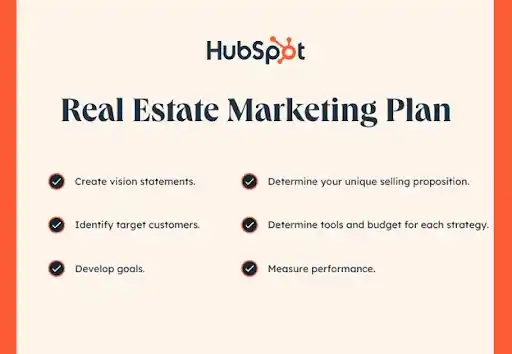
A real estate marketing plan outlines the strategic approach that real estate professionals use to promote properties and services to their target audience.
Real estate marketing plan is more than just selling; it’s about creating a consistent and persuasive message that resonates with potential buyers and sellers.
This real estate marketing plan serves as a roadmap, guiding all marketing efforts and ensuring they align with the overall business objectives.
Market Research: Understanding the local market, including demographic and economic factors, helps tailor the marketing to match buyer and seller profiles.
Goal Setting: Clearly defined goals guide the direction and effectiveness of marketing activities, ensuring they are measurable and achievable.
Budgeting: Allocating resources wisely ensures that the most effective tactics are prioritized, maximizing return on investment.
Marketing Channels: Selection of the right channels—digital, print, events, and direct mail—based on where the target audience spends their time.
Action Plan: A detailed description of every campaign, the timeline, and the responsibilities assigned to each team member.
What Makes a Good Real Estate Marketing Plan?
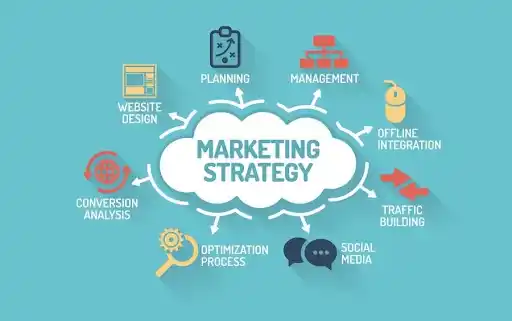
A good real estate marketing plan doesn’t just spread the word about your listings; it builds and maintains relationships with your audience.
Here’s what sets a superior real estate marketing plan apart:
Focused Objectives: A sharp focus on attainable objectives is crucial. These should be specific, measurable, achievable, relevant, and time-bound (SMART).
This precision prevents scattering resources too thinly and keeps efforts aligned with broader business goals.
Comprehensive Market Analysis: An effective real estate marketing plan stems from a deep understanding of the market. Knowing what current and potential clients need and value steers the plan towards strategies that resonate with them, rather than generic broad-spectrum tactics.
Integrated Marketing Strategies: Successful real estate marketing plan use a mix of traditional and digital real estate marketing strategies.
This might include everything from SEO and content marketing to public open houses. Integrating these tools creates multiple touchpoints for engagement, broadening reach and deepening impact.
Leveraging Technology: Incorporating technology like a chatbot for real estate can significantly enhance interaction with clients.
Chatbots provide instant responses to client inquiries on platforms such as WhatsApp, Instagram, and your main website, ensuring leads are captured and nurtured promptly.
Adaptability: The best plans are flexible. They include mechanisms for monitoring performance and adapting tactics based on what the data shows.
This might mean shifting funds towards more effective channels or tweaking your real estate marketing strategy midway through a campaign.
Consistency Across Channels: Consistency in your messaging and branding across all channels reinforces your professional image and makes your message more credible.
Whether it’s a blog post, a social media update, or an email blast, your voice should be unmistakable and your brand instantly recognizable.
Continuous Evaluation and Refinement: Regularly reviewing what works and what doesn’t allows you to improve continuously.
This might involve A/B testing different real estate marketing strategies, soliciting customer feedback, or analyzing engagement metrics to refine your approach.
In essence, a solid real estate marketing plan should be thought of as a dynamic, living document that evolves.
It’s not just a way to advertise properties but a comprehensive strategy to connect genuinely and effectively with your audience, utilizing tools like chatbots for real estate to facilitate smoother interactions.
The focus should always be on building lasting relationships and positioning oneself as a trusted advisor in the real estate market.
Creating Your Real Estate Marketing Plan
To succeed in real estate, a solid strategy is indispensable. The creation of your real estate marketing plan should start with a thorough understanding of your audience and clear objectives.
This section walks you through these foundational steps to ensure your marketing efforts hit the mark every time.
Understanding Your Target Market

Identifying who you are marketing to is the first step in crafting an effective real estate marketing plan.
Real estate markets can be segmented by different types of clients, such as homeowners, renters, and investors.
Each group has unique needs and preferences that influence their decision-making processes.
Homeowners: Typically, homeowners are interested in property values, community information, and market trends that might affect their home's value.
Tailoring content that provides insights into these areas can capture their interest and build credibility.
Renters: Renters often seek affordability, convenience, and flexible lease options. Real estate marketing plan for this segment can highlight property features like location, price, and amenities that align with a transient lifestyle or those looking to transition to ownership.
Investors: This group is generally more numbers-driven, looking for information on returns on investment, market conditions, and growth areas.
Content for investors should be data-rich, providing analytics and forecasts to help them make informed decisions.
Understanding these distinctions helps in tailoring messages that resonate with each segment, making your real estate marketing plan more effective and targeted.
Setting Clear Marketing Objectives
Clear, well-defined objectives are the backbone of any successful real estate marketing strategy.
Setting goals that are specific, measurable, achievable, relevant, and time-bound (SMART) provides direction and facilitates the evaluation of the plan’s effectiveness over time.
Specific: Goals should be clear and concise. For instance, "Increase new client inquiries by 20% within the next quarter" is more specific than “Get more business.”
Measurable: Each goal needs a metric. In the above example, the 20% increase is a quantifiable target to aim for and assess.
Achievable: Goals should be realistic, considering the resources available. Setting the bar too high can be as counterproductive as setting it too low.
Relevant: Objectives must align with the broader goals of your business. For instance, if your aim is to expand into new markets, your real estate marketing plan should focus on reaching potential clients in those areas.
Time-bound: Assigning deadlines not only provides motivation but also a timeframe for measuring success. It helps in planning and prioritizing tasks effectively.
Having established a clear understanding of your target market and set specific marketing objectives, the next steps in your real estate marketing plan involve crafting a distinctive brand identity and utilizing modern digital marketing strategies to communicate effectively and engage your audience.
Developing Your Brand Identity

A strong brand identity is crucial in the competitive real estate market.
It’s not just about a logo or a tagline; it’s about creating a consistent brand voice and image that resonates across all your marketing channels.
Consistency is Key: Your brand voice should be consistent whether you are writing a blog post, crafting a tweet, or speaking at a conference.
This consistency helps in building trust and recognition among your audience. Consistency in visual elements like colors, fonts, and logos also helps to reinforce brand recall.
Simplicity Connects: Using simple, clear language helps in making your real estate brand approachable and understandable to everyone.
Avoid industry jargon that might confuse or alienate potential clients who are not as well-versed in real estate terminology.
Instead, focus on speaking directly and plainly about what you can offer and the benefits they stand to gain. This clarity can significantly enhance the customer experience and make your brand more relatable.
Utilizing Digital Marketing Strategies
An effective real estate marketing strategy must leverage various online platforms to reach and engage potential clients where they spend a significant amount of their time.
SEO (Search Engine Optimization): Ensure your website and blog content are optimized for search engines to increase visibility.
Using relevant keywords, maintaining a mobile-friendly website, and ensuring fast loading speeds can help your site rank higher in search results.
Email Marketing: An excellent tool for direct communication. Use it to send updates, newsletters, and personalized offers directly to the inbox of your potential or current clients.
Social Media: Platforms like Facebook, Twitter, and Instagram allow you to reach a broader audience. Regular posts, live sessions, and interactive content can help keep your audience engaged and informed about your services and listings.
Implementing Chatbot for Real Estate
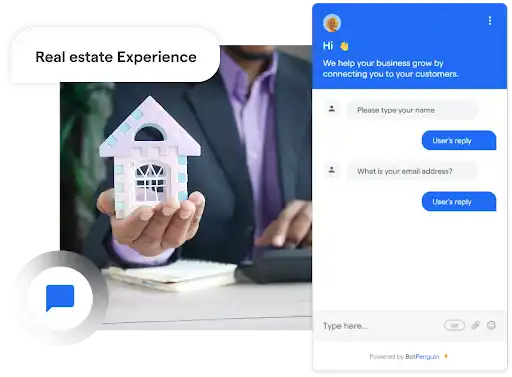
Here is how to implement Chatbot for real estate:
On Messaging Platforms: Implementing a chatbot for real estate on platforms like WhatsApp, Instagram, and Messenger can dramatically increase your interaction rates.
These chatbots can provide instant responses to common queries about listings, pricing, and services, which keeps potential clients engaged even when you are not available to respond immediately.
On Real Estate Websites: Integrating chatbots for real estate on your website can guide visitors through your site, answer their questions in real-time, and even schedule appointments or showings. This not only improves the user experience but also helps in capturing leads directly from your website.
BotPenguin chatbots are a powerful tool in the arsenal of real estate marketing strategies.
They serve not only as a point of contact but also as a resource for potential clients to learn more about their options, understand the market better, and make informed decisions. These automated systems can handle initial inquiries and basic information exchanges, freeing up your time to focus on more personalized client interactions.
By developing a robust brand identity and employing strategic digital marketing tactics, including the innovative use of BotPenguin's chatbots for real estate, your real estate marketing plan can achieve greater efficiency and effectiveness.
This approach not only broadens your reach but also deepens your connection with clients, fostering trust and loyalty that are essential in the real estate market.
Content Marketing Approach
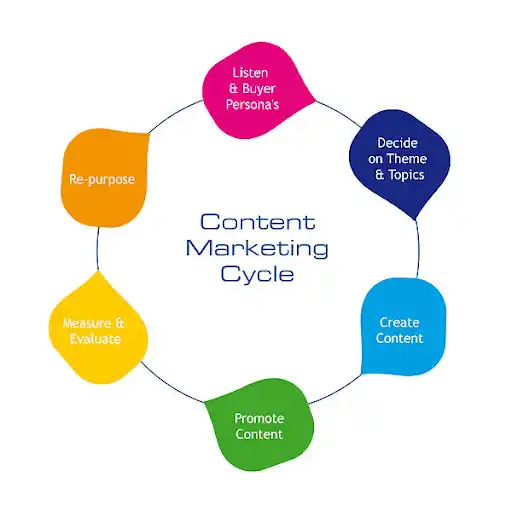
Providing valuable content is key to attracting and engaging potential clients.
Content marketing involves the creation and distribution of useful, relevant information that positions you as a knowledgeable and trustworthy expert in the field.
High-quality content like blogs, detailed guides, and video tours can educate your audience about the real estate market, advising them on important considerations when buying or selling property.
This not only informs but also builds trust, a critical element in any real estate marketing strategy.
Examples of Engaging Content:
Blogs: Write about topics ranging from home maintenance tips to market trends and neighborhood reviews. This can help clients at various stages of their real estate journey.
Guides: Produce comprehensive guides on the home buying or selling process, financing options, and more. These are invaluable resources for first-time buyers or foreign investors.
Video Tours: Showcase properties through video tours to provide a realistic view of listings. This is especially effective for reaching out-of-town buyers or those scouting properties amid social distancing.
Suggested Reading:
How can Botpenguin Chatbots Help Your Real Estate Business?
Offline Marketing Techniques
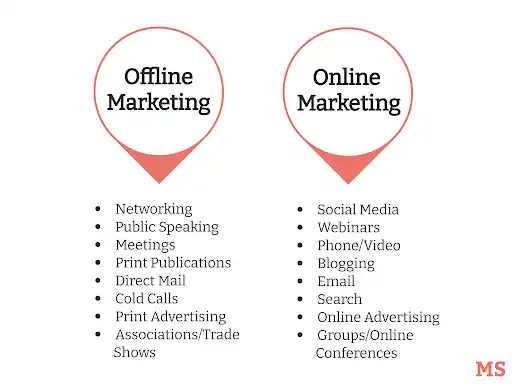
While digital strategies are essential, traditional offline marketing techniques still play a vital role in a well-rounded real estate marketing plan.
Networking Events: Personal connections can be the most powerful marketing tool. Attend or host local real estate events to meet potential clients and other professionals.
This personal engagement creates opportunities for referrals and partnerships.
Billboards and Direct Mail: Large-format ads and physical mailings can capture the attention of local prospects. Billboards are effective in high-traffic areas, while direct mail can target specific neighborhoods or demographics.
Integrating Offline and Online Marketing: To maximize impact, synchronize your online and offline marketing efforts. For instance, promote your networking events on social media or follow up an open house with an email campaign.
This integrated approach ensures consistent messaging and reinforces your presence across all channels.
Measuring and Adjusting Your Real Estate Marketing Plan

For any real estate marketing plan to remain effective, it must be continually monitored and refined based on performance data.
Analytics Software: Use tools like Google Analytics to track website traffic, engagement, and conversion rates. Social media platforms also provide insights into post performance and audience behavior.
CRM Systems: Customer Relationship Management (CRM) systems can help track leads, sales conversions, and the effectiveness of different marketing campaigns.
Suggested Reading:
How to Generate Leads for Real Estate: 10 Useful Ideas
When and How to Pivot Your Real Estate Marketing Strategy
Here is how to pivot your real estate marketing strategy:
Regular Reviews: Schedule monthly or quarterly reviews of your marketing plan to assess what’s working and what isn’t. This helps in identifying trends and making informed decisions.
- Based on Analytics: If certain aspects of your plan, such as a particular advertising campaign or chatbot for real estate, are not yielding the expected results, consider reallocating your budget or tweaking your tactics.
Feedback Loops: Incorporate feedback from clients to understand their needs and preferences better. This direct input can be instrumental in refining your marketing messages and methods.
A successful real estate marketing plan is dynamic and adaptable, responding not only to the market's demands but also to the effectiveness of its own strategies.
By regularly assessing each element of the plan—from content to offline efforts—and adjusting based on concrete data and feedback, you can ensure your marketing remains effective and aligned with your business goals.
This proactive approach allows you to stay ahead in a competitive market, continually optimizing your outreach and engagement with potential clients.
Conclusion
A well-crafted real estate marketing plan is the cornerstone of success in the ever-evolving property market.
By embracing a diverse range of real estate marketing strategies, professionals can adapt to changing consumer behaviors and market dynamics.
The key lies in continually refining your real estate marketing strategy based on performance data and emerging trends.
Effective real estate marketing plan integrates both traditional and digital approaches, ensuring a broad reach and personalized engagement.
Incorporating a chatbot for real estate, such as BotPenguin, into your marketing plan can significantly enhance lead generation and customer service, providing round-the-clock support and qualifying prospects efficiently.
Remember, the best real estate marketing strategies are those that resonate with your target audience.
Ultimately, a successful real estate marketing plan is an ongoing process of experimentation, analysis, and optimization.
The goal is not just to market properties, but to build lasting relationships and establish yourself as a trusted advisor in the real estate market, and BotPenguin can play a crucial role in achieving this objective.
Suggested Reading:
9 Real Estate Marketing Tips Enhanced by WhatsApp Chatbots
Frequently Asked Questions (FAQs)
Why is a marketing plan important for real estate?
It provides a structured approach to attract buyers and sellers, enhancing brand visibility and increasing conversions.
What are the 4 P's of marketing in real estate?
The 4 P's are: Product (The actual properties for sale or rent, their features, and appeal), Price (How the property is priced relative to the market and its perceived value), Place (Location of the property and the platforms used for listings), Promotion (Marketing tactics used to make the property known, such as ads, social media, and open houses).
What are the key components of an effective real estate marketing plan?
Key components include market analysis, setting clear goals, branding, digital and offline marketing strategies, and consistent evaluation and adjustment.
How do digital marketing strategies enhance real estate marketing?
Digital marketing expands reach, engages more effectively with target audiences, and utilizes tools like SEO and social media to boost visibility and interaction.
How often should a real estate marketing plan be reviewed?
Review and adjust your marketing plan at least quarterly to adapt to market changes and optimize strategies based on performance data.
Can chatbots be integrated into a real estate marketing strategy?
Yes, chatbots can automate customer interactions on websites and social media, providing immediate assistance and improving lead capture.
What is the benefit of using a CRM in real estate marketing?
A CRM system organizes client data, improves lead management, and enhances follow-ups and customer service, boosting overall efficiency and client satisfaction.


